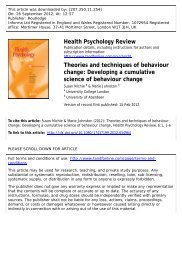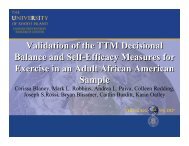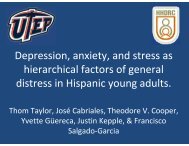Cognitive Function and Stress in Obesity: A Lifespan Approach
Cognitive Function and Stress in Obesity: A Lifespan Approach
Cognitive Function and Stress in Obesity: A Lifespan Approach
You also want an ePaper? Increase the reach of your titles
YUMPU automatically turns print PDFs into web optimized ePapers that Google loves.
<strong>Cognitive</strong> function <strong>and</strong><br />
stress <strong>in</strong> obesity: A lifespan<br />
approach<br />
John Gunstad, PhD<br />
Department of Psychology<br />
Kent State University
Overview<br />
<strong>Obesity</strong> is associated<br />
with cognitive<br />
deficits<br />
<strong>Stress</strong> exacerbates<br />
cognitive<br />
impairment<br />
<strong>Cognitive</strong> deficits<br />
lead to poor cl<strong>in</strong>ical<br />
outcomes<br />
Image from:<br />
www.thenetworkgardens.blogs.com
Body Mass Index <strong>and</strong><br />
Attention/Executive <strong>Function</strong><br />
Inverse relationship between BMI <strong>and</strong> performance on tests<br />
of attention <strong>and</strong> executive function<br />
Attention<br />
** denotes p
Body Mass Index <strong>and</strong><br />
Attention/Executive <strong>Function</strong><br />
Executive<br />
Verbal Interference<br />
function<br />
Number of correct words<br />
14<br />
12<br />
10<br />
8<br />
6<br />
4<br />
2<br />
0<br />
Normal Weight<br />
Overweight/Obese<br />
poorer <strong>in</strong><br />
obese/over<br />
weight<br />
Younger <strong>and</strong> Older Adults<br />
No age X group<br />
<strong>in</strong>teraction<br />
Gunstad, J., Paul, R., Cohen, R., Tate, D., Spitznagel, M.B., & Gordon, E. (2007) Comprehensive Psychiatry.
Body Mass Index <strong>and</strong> Memory<br />
35<br />
Obese participants<br />
performed more<br />
poorly than normal<br />
<strong>and</strong> overweight<br />
30<br />
25<br />
20<br />
15<br />
10<br />
Normal<br />
Overweight<br />
Obese<br />
participants <strong>in</strong> verbal<br />
list learn<strong>in</strong>g <strong>and</strong><br />
recall<br />
5<br />
0<br />
Learn<strong>in</strong>g Recall Recognition<br />
Learn<strong>in</strong>g p
<strong>Obesity</strong> <strong>and</strong> cognitive function <strong>in</strong><br />
children <strong>and</strong> adolescents<br />
478 healthy 6-19 year olds<br />
No relationship (BMI = 26 <strong>in</strong> overweight grp)<br />
Test<br />
Body Mass Index (BMI)<br />
Digit Span Backward -0.05<br />
Switch Attention—Let/Num 0.05<br />
Verbal Recall 0.04<br />
Animal Fluency 0.03<br />
F<strong>in</strong>ger Tapp<strong>in</strong>g 0.02<br />
Gunstad et al. Appetite 2008; 50: 246-251
<strong>Obesity</strong> <strong>and</strong> cognitive function <strong>in</strong><br />
children <strong>and</strong> adolescents (cont.)<br />
25 obese adolescents (avg BMI=54)<br />
Difficulties <strong>in</strong> attention <strong>and</strong> executive function<br />
Test<br />
z scores<br />
Digit Span -0.93 ± 1.19*<br />
Switch of Attention -1.07 ± 1.01*<br />
Maze Errors -0.58 ± 0.89*<br />
Verbal Interference-Word -1.12 ± 0.93*<br />
Verbal Interference-Color -0.82 ± 1.02*<br />
Lokken et al SOARD 2009: 5: 547-552
<strong>Obesity</strong> <strong>and</strong> accelerated cognitive<br />
decl<strong>in</strong>e<br />
1703 participants from the Baltimore<br />
Longitud<strong>in</strong>al Study on Ag<strong>in</strong>g<br />
Exam<strong>in</strong>ed association between multiple obesity<br />
<strong>in</strong>dices <strong>and</strong> cognitive function over time<br />
Age 55 ± 16 years, 50% female, 25% m<strong>in</strong>ority,<br />
avg 3 visits<br />
Gunstad, J., et al. (2010). Neuroepidemiol
<strong>Obesity</strong> <strong>and</strong> Cognition<br />
Over Time (cont.)<br />
Ma<strong>in</strong> effects:<br />
Worse global,<br />
mem, exec fx, <strong>and</strong><br />
lang; better attn,<br />
visuospatial<br />
Interactions:<br />
Worse mem <strong>and</strong><br />
exec fx; better<br />
attn<br />
Gunstad, J., et al. (2010). Neuroepidemiol
<strong>Cognitive</strong> impairment limits<br />
weight loss<br />
Reduced cognitive function is<br />
<strong>in</strong>dependently associated with reduced<br />
weight loss at 12 <strong>and</strong> 24 months <strong>in</strong> bariatric<br />
surgery patients (Spitznagel et al., <strong>in</strong> press)<br />
Some evidence for similar pattern <strong>in</strong><br />
behavioral weight loss (Witbrach et al.,<br />
2012)
Connect<strong>in</strong>g cognitive function<br />
<strong>and</strong> weight loss<br />
Likely l<strong>in</strong>ked through reduced<br />
plann<strong>in</strong>g/monitor<strong>in</strong>g <strong>and</strong> self regulation<br />
Reduced executive function is associated<br />
with dis<strong>in</strong>hibited eat<strong>in</strong>g <strong>in</strong> obese<br />
adolescents (Maayan et al., 2011)
<strong>Stress</strong> impairs cognitive function<br />
Both physical<br />
<strong>and</strong> mental<br />
stress impairs<br />
cognitive<br />
function<br />
Attention,<br />
executive<br />
function, <strong>and</strong><br />
memory are<br />
most affected
Elevated stress <strong>in</strong> obesity<br />
Physiological stress<br />
Inflammatory processes<br />
ANS disruption<br />
Insul<strong>in</strong> resistance<br />
Medical conditions<br />
Sleep<br />
Pa<strong>in</strong><br />
Psychological <strong>Stress</strong><br />
Fatigue<br />
Pa<strong>in</strong><br />
Stigma/prejudice<br />
History of<br />
trauma/abuse<br />
Psychological disorders<br />
SES
Impaired cognitive function leads<br />
to poor cl<strong>in</strong>ical outcomes<br />
Dr. S<strong>in</strong>ha’s work provides <strong>in</strong>sight <strong>in</strong>to the<br />
mechanisms by which stress can directly<br />
lead to greater impulsivity, food crav<strong>in</strong>g,<br />
relapse <strong>in</strong>to bad habits, etc, <strong>in</strong> obese<br />
<strong>in</strong>dividuals<br />
Will hear about this next
Cl<strong>in</strong>ical implications, part 1<br />
Persons<br />
with<br />
impaired<br />
cognitive<br />
function<br />
might be<br />
less able<br />
to lose<br />
weight
Cl<strong>in</strong>ical implications, part 2<br />
Rout<strong>in</strong>e evaluation of cognitive function to<br />
identify level of impairment<br />
Covered by third-party for bariatric surgery<br />
<strong>in</strong> many states<br />
Can tailor <strong>in</strong>tervention depend<strong>in</strong>g on level<br />
of impairment<br />
More impaired = more behavioral<br />
Less impaired = more cognitive
Acknowledgments<br />
Ronald Cohen<br />
Ross Crosby<br />
Michael Devl<strong>in</strong><br />
James Mitchell<br />
Robert Paul<br />
Mary Beth Spitznagel<br />
Gladys Stra<strong>in</strong><br />
Rena W<strong>in</strong>g<br />
National Institutes of<br />
Health, <strong>in</strong>clud<strong>in</strong>g<br />
NIDDK <strong>and</strong> NHLBI<br />
LABS<br />
Baltimore Longitud<strong>in</strong>al<br />
Study of Ag<strong>in</strong>g (BLSA),<br />
<strong>in</strong>clud<strong>in</strong>g Carr<strong>in</strong>gton<br />
Rice Wendell, Luigi<br />
Ferrucci, <strong>and</strong> Alan<br />
Zonderman

















